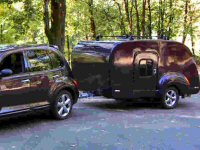cfiles wrote:Questions that I have:
1) Will a 300W inverter be enough? (LCD, DVD, and electric blanket...that is all I plan on running on it)
Doubt that 300W is anywhere close enough for an electric blanket. LCD/DVD should be fine, but I'd use a 12v blanket or go direct to shorepower.
cfiles wrote:2) The fuse boxes that I am using are for automobiles. Will that work for the AC side? What kind of fuse should I use (15Amp, 30Amp, ?)
It will as long as the fuses/holders are rated for the voltage. The common oldschool glass fuses are generally 250v and are used for all kinds of AC uses. I don't recall the ratings for blade style fuses. You can also use a typical home fuse/breaker panel. The rating of the fuse should be based on the max power you can pull on that circuit without burning something up. iow, 14 guage wire is typically used to carry 15A. So you fuse the ciruit at 15 A. If you don't, and pull 30A or so, that 14g wire becomes a heater, which is a bad thing...
With only 300W (3A or so at 120v), use small fuses.
cfiles wrote:3) Is it worth it to wire the tow vehicle to the battery and charge while I am driving? I have a newer (2005) vehicle that I am sure is smart enough not to charge while off.
Yes. But I never camp where there is shore power, so I'm biased.
cfiles wrote:4) What do I need to do with the AC ground? I am sure a floating circuit will do and I can just ignore it; am I correct?
GFI. GFI GFI GFI. The you won't need a ground.
I'd rethink the inverter thing. If ALL you want to run is DVD/LCD, get 12V versions. Then no 120V wiring at all. AC/Microwave would require shore power.


 OK why complicate it at all. If you are using an electric blanket when on shore power, why not put in a breaker box or use a drop cord. Some outlets just like a house will do.
OK why complicate it at all. If you are using an electric blanket when on shore power, why not put in a breaker box or use a drop cord. Some outlets just like a house will do. 



